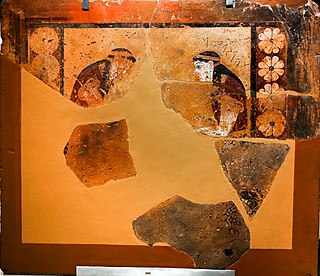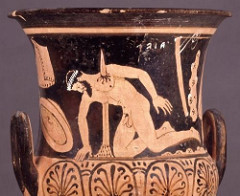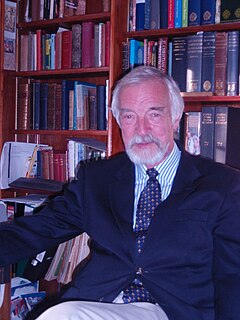Related Research Articles

Aristophanes, son of Philippus, of the deme Kydathenaion, was a comic playwright or comedy-writer of ancient Athens and a poet of Old Attic Comedy. Eleven of his forty plays survive virtually complete. These provide the most valuable examples of a genre of comic drama known as Old Comedy and are used to define it, along with fragments from dozens of lost plays by Aristophanes and his contemporaries.

Boudica or Boudicca, also known as Boadicea or Boudicea, and in Welsh as Buddug, was a queen of the British Iceni tribe who led an uprising against the conquering forces of the Roman Empire in AD 60 or 61. According to Roman sources, shortly after the uprising failed, she poisoned herself or died of her wounds, although there is no actual evidence of her fate. She is considered a British folk hero.

Gaius Valerius Catullus, often referred to simply as Catullus, was a Latin poet of the late Roman Republic who wrote chiefly in the neoteric style of poetry, focusing on personal life rather than classical heroes. His surviving works are still read widely and continue to influence poetry and other forms of art.

Euripides was a tragedian of classical Athens. Along with Aeschylus and Sophocles, he is one of the three ancient Greek tragedians for whom any plays have survived in full. Some ancient scholars attributed ninety-five plays to him, but the Suda says it was ninety-two at most. Of these, eighteen or nineteen have survived more or less complete. There are many fragments of most of his other plays. More of his plays have survived intact than those of Aeschylus and Sophocles together, partly because his popularity grew as theirs declined—he became, in the Hellenistic Age, a cornerstone of ancient literary education, along with Homer, Demosthenes, and Menander.

The Bacchae is an ancient Greek tragedy, written by the Athenian playwright Euripides during his final years in Macedonia, at the court of Archelaus I of Macedon. It premiered posthumously at the Theatre of Dionysus in 405 BC as part of a tetralogy that also included Iphigeneia at Aulis and Alcmaeon in Corinth, and which Euripides' son or nephew is assumed to have directed. It won first prize in the City Dionysia festival competition.

Philomela or Philomel is a minor figure in Greek mythology who is frequently invoked as a direct and figurative symbol in literary and artistic works in the Western canon.

The Metamorphoses is an 8 AD Latin narrative poem by the Roman poet Ovid, considered his magnum opus. Comprising 11,995 lines, 15 books and over 250 myths, the poem chronicles the history of the world from its creation to the deification of Julius Caesar within a loose mythico-historical framework.
The Persians is an ancient Greek tragedy written during the Classical period of Ancient Greece by the Greek tragedian Aeschylus. It is the second and only surviving part of a now otherwise lost trilogy that won the first prize at the dramatic competitions in Athens' City Dionysia festival in 472 BC, with Pericles serving as choregos.

Tuonela is the realm of the dead or the Underworld in Finnish mythology. Tuonela, Tuoni, Manala, and Mana are used synonymously. Similar realms appear in most Finnic cultural traditions, including among Karelian, Ingrian, and Estonian beliefs. In Estonian mythology, the realm is called Toonela or Manala. Tuonela can also refer to a grave or a graveyard.

George Gilbert Aimé Murray was an Australian-born British classical scholar and public intellectual, with connections in many spheres. He was an outstanding scholar of the language and culture of Ancient Greece, perhaps the leading authority in the first half of the twentieth century. He is the basis for the character of Adolphus Cusins in his friend George Bernard Shaw's play Major Barbara, and also appears as the chorus figure in Tony Harrison's play Fram.

Ancient Greek comedy was one of the final three principal dramatic forms in the theatre of classical Greece. Athenian comedy is conventionally divided into three periods: Old Comedy, Middle Comedy, and New Comedy. Old Comedy survives today largely in the form of the eleven surviving plays of Aristophanes; Middle Comedy is largely lost, i.e. preserved only in relatively short fragments by authors such as Athenaeus of Naucratis; and New Comedy is known primarily from the substantial papyrus fragments of Menander.

Sophocles' Ajax, or Aias, is a Greek tragedy written in the 5th century BCE. Ajax may be the earliest of Sophocles' seven tragedies to have survived, though it is probable that he had been composing plays for a quarter of a century already when it was first staged. It appears to belong to the same period as his Antigone, which was probably performed in 442 or 441 BCE, when he was 55 years old. The play depicts the fate of the warrior Ajax, after the events of the Iliad but before the end of the Trojan War.

Philoctetes is a play by Sophocles. The play was written during the Peloponnesian War. It is one of the seven extant tragedies by Sophocles. It was first performed at the City Dionysia in 409 BC, where it won first prize. The story takes place during the Trojan War. It describes the attempt by Neoptolemus and Odysseus to bring the disabled Philoctetes, the master archer, back to Troy from the island of Lemnos.

Bees have been featured in myth and folklore around the world. Honey and beeswax have been important resources for humans since at least the Mesolithic period, and as a result humans' relationship with bees—particularly honey bees—has ranged from encounters with wild bees to keeping them agriculturally. Bees themselves are often characterized as magically-imbued creatures, and their honey as a divine gift.
Frederic Michael Raphael is an American-born, British BAFTA and Academy Award winning screenwriter, biographer, nonfiction writer, novelist and journalist.

Children of Heracles is an Athenian tragedy by Euripides that was first performed c. 430 BC. It follows the children of Heracles as they seek protection from Eurystheus. It is the first of two surviving tragedies by Euripides where the children of Heracles are suppliants.

Roman mythology is the body of myths of ancient Rome as represented in the literature and visual arts of the Romans. One of a wide variety of genres of Roman folklore, Roman mythology may also refer to the modern study of these representations, and to the subject matter as represented in the literature and art of other cultures in any period. Roman mythology draws from the mythology of the Italic peoples and ultimately from Proto-Indo-European mythology.

Charles Moseley, who also publishes as C. W. R. D. Moseley, is an English writer, scholar, and teacher, and a former fellow of Wolfson College and Life Fellow of Hughes Hall in Cambridge, as well as a fellow of the English Association, the Society of Antiquaries of London, and the Royal Society of Arts.

Insects have appeared in mythology around the world from ancient times. Among the insect groups featuring in myths are the bee, fly, butterfly, cicada, dragonfly, praying mantis and scarab beetle.
References
- 1 2 3 4 Stephen Unwin, Obituary: Kenneth McLeish, The Independent , 11 December 1997.